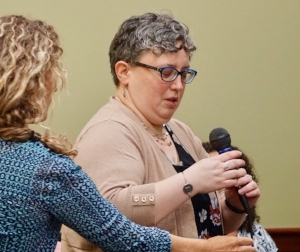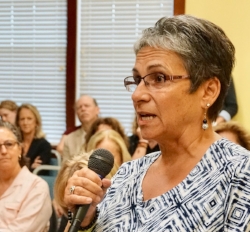Families Struggle While Federal Judge Awaits Progress Report On RI DD System Reform
/By Gina Macris
Tonya LeCour, a teacher who is scheduled to return to work Sept. 1, also serves as the sole caregiver for a family member with developmental disabilities.
What will happen to her job if she can’t find daytime supports for the person who depends on her?
LeCour was among several participants who sounded similar concerns at a virtual forum hosted online by the Rhode Island Division of Developmental Disabilities Aug. 17, with technical assistance from the Rhode Island Parent Information Network.
The comments reprised the July 30 testimony of Carol Dorros, M.D., who told Chief Judge John J. McConnell, Jr. of the U.S. District Court of her experience caring for her adult son with developmental disabilities fulltime, and her inability to practice medicine, since the COVID-19 pandemic hit Rhode Island in March.
Those familiar with the developmental disabilities community say they believe there are hundreds of people facing wrenching stituations similar to those described by Dorros and LeCour.
Rhode Island is now days away from a court-imposed deadline of August 30 – the first of six such target dates – to outline its strategies for shoring up the developmental disabilities system in the short term and ensuring it complies in the long run with a 2014 consent decree seeking to enforce the Americans With Disabilities Act.
The court’s review comes against the background of strained state finances.
The state budget office has sent a memo to all department heads, including A. Kathryn Power, director of the Department of Behavioral Healthcare, Developmental Disabilities and Hospitals (BHDDH) to submit budget proposals for the next fiscal year that cut overall spending by 15 percent.
In a statement, a spokesman said “BHDDH, like all state departments, is working with its financial team and program managers to assess all options in meeting the 15 percent reduction in FY 22 spending, per the OMB (Office of Management and Budget) guidance.”
At the same time, the state Division of Developmental Disabilities has convened several “workgroups” to tackle the issues, and, according to McConnell’s order, is expected to submit a report Aug. 30 that will “describe the process or strategy” for addressing the problems, the timeline for resolving them, and the particular agency or agencies responsible for each item. ( Update: The report was submitted to an independent court monitor, A. Anthony Antosh, who said it was under his review the week of Sept. 6 and would be submitted to the court when the review is finished.)
The developmental disabilities issues are complex. They include include reimbursement rates keyed to staffing ratios that were designed for congregate care and do not translate well to community activities.
For example, the reimbursement structure may require a support person to take along five people with the same budget authorization on a community activity, whether or not their needs or interests fit into the purpose of the outing. Conversely, staffers may have to jump through hoops to come up with an activity that will appeal to all members of the group.
People receiving services may opt for one-on-one assistance, but that decreases the number of service hours during the week. A typical funding authorization for one person translates into about six hours a week of one-on-one help, according to calculations of the Community Provider Network of Rhode Island, a trade association.
In re-shaping the system, the state has at its disposal a recently-completed 134-page report from the New England States Consortium Systems Organization (NESCSO), which was hired more than 18 months ago at a cost of $1.1 million to conduct a comprehensive study that grew out of increasing demand for a review of rates paid to private providers of developmental disability services.
At the request of BHDDH, NESCSO’s consultants did not make specific recommendations but conducted an exhaustive assessment of the current y situation and presented options for change that the state might consider.
NESCSO described the financial position of the three dozen agencies providing services as “tenuous,” re-affirming interim findings made before the pandemic hit.
The report suggested that an increase in long-term employment among adults with developmental disabilities could save the state millions of dollars in the long run that would otherwise be spent on daytime supports.
However, increasing employment, a goal of the consent decree, would require an up-front investment in employment-related supports and retaining the staff necessary to carry them out.
NESCSO estimates that a 33 percent increase in wages, now an average of $13.18 for front line workers, will result in a 50 percent reduction in turnover, which ranges up to 58 percent in some agencies.
BHDDH has not made any public comment on the report.
In the meantime, service providers seem to be keeping a lid on the pandemic in group homes but are struggling to provide scaled-up daytime supports that meet safety guidelines under the current funding structure.
As of Aug. 25, a total of 164 group home residents had tested positive since the start of the COVID-19 pandemic, three more than reported July 21. Of that total, 48 have been hospitalized and 10 have died, according to a BHDDH spokesman. The numbers indicate that the five people who were hospitalized in late July have all been discharged. The most recent death was reported in June.
During the Aug. 17 public hearing, Kevin Savage, director of the Division of Developmental Disabilities, said, “we don’t want to just go back to doing things the old way.”
He offered to speak privately after the meeting with several individuals, including LeCour, the teacher, and a woman whose sister was in a group home and having problems eating as a result of the social isolation brought on by the pandemic.
Linda Ward, executive director of Opportunities Unlimited, chimed in with the providers’ perspective:
“It’s not about re-opening (daytime services) but meeting a person’s needs one person at a time,” she said. Funding limitations may dictate that individuals get one day a week of services, she said.
And there’s no “community” to access except for a socially distanced one, Ward said. Moreover,
staff are concerned about exposing themselves and their families to the virus, she said.
“I know that’s not helpful to families desperate for supports but we have to do it one at a time,” Ward said.
Meanwhile, the state’s finances, battered by the COVID-19 pandemic, remain in flux. Much could change before the budget is finalized for the 2022 fiscal year, which begins next July 1. The state budget director, Jonathan Womer, says as much in his memo to department heads dated Aug. 7.
In terms of developmental disabilities issues, Judge McConnell has ordered officials in both the executive and legislative branches, who hold the state’s purse strings, to participate “as needed” in a year-long review of 16 specific issues of concern, and to help find solutions to them.
BHDDH has held initial meetings of five “workgroups” to address issues raised in the judge’s order. In its most recent developmental disabilities community newsletter, the agency put out a call for volunteers interested in working on one of the five committees.
“We are looking for individuals receiving services and family members to participate in their choice of one of five workgroups to add their expertise and input into the system reform,” the newsletter said.
Anyone interested may email Cindy Fusco at Cynthia.Fusco@bhddh.ri.gov.
The newsletter described the workgroups as follows:
1. Eligibility Process Workgroup: This workgroup will look at the process for determining the support needs of each individual and the need to consolidate the application for all pertinent RI services into one process.
2. Appeals Process Workgroup: This workgroup will look at the appeals process for individuals as it relates to eligibility, level of need, or funding level, including the L9/S109 (appeals) process for requesting additional funding.
3. Individual Budgets and Authority Workgroup: This workgroup will look at the process and timeline for developing annual individual budgets responsive to individual needs, allowable costs, and flexibility.
4. Fiscal Workgroup: This workgroup will look at authorizatons, rates, and billing units.
5. Contracts Workgroup: This workgroup will look at the timeline and process by which individuals contract with providers, billing procedures, and how to increase individual control over their services and how their budget is spent.














